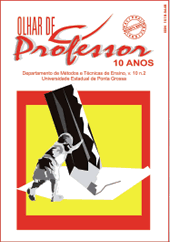A LITERATURA INFANTIL E O VÍDEO NA ESCOLA DO HOSPITAL: DIFERENTES LINGUAGENS DE INCLUSÃO SOCIAL
Main Article Content
Abstract
Os objetivos deste artigo são descrever e analisar episódios que apontam a importância do vídeo e da literatura infantil para crianças e adolescentes hospitalizados. O artigo é parte dos dados provenientes da pesquisa de campo de uma tese de doutorado. Os fundamentos teórico-metodológicos da tese estiveram pautados na etnografia. A pesquisa de campo foi realizada no período de um ano com filmagens das aulas das professoras da Educação Infantil e do Ensino Fundamental e Médio de uma escola de Hospital Filantrópico na cidade de Salvador-Bahia. O que foi possível verificar é que a literatura infantil e os vídeos produzidos nas salas de aulas do hospital, foram recursos expressivos para as crianças e adolescentes hospitalizados compartilharem dores, alegrias, conhecimentos e repensarem sobre suas condições de vida e de internação. O trabalho com as artes em geral possibilitou compreender o papel dessas diferentes linguagens na escola do hospital como recursos utilizados na inclusão de crianças e adolescentes nas atividades. Também possibilitou entender a forma com a qual as crianças e adolescentes queriam agir, não somente como usuários do serviço de saúde e educação, mas transformadores da realidade e do cotidiano hospitalar.
Downloads
Article Details
Authors who publish in this journal agree with the following terms:
a) Authors keep the copyrights and concede the right of its first publication to the magazine. The work piece must be simultaneously licensed on the Creative Commons Attribution License which allows the paper sharing, and preserves both the author identity and the right of first publication to this magazine.
b) Authors are authorized to assume additional contracts separately, to not-exclusively distribution of the paper version published in this magazine (e.g.: publish in institutional repository or as a book chapter), with the author identity recognition and its first publication in this magazine.
c) Authors are permitted and stimulated to publish and distribute their papers online (e.g.: in institutional repository or on their personal webpage), considering it can generate productive alterations, as well as increase the impact and the quotations of the published paper.
d) This journal provides public access to all its content, as this allows a greater visibility and reach of published articles and reviews. For more information on this approach, visit the Public Knowledge Project, a project that developed this system to improve the academic and public quality of the research, distributing OJS as well as other software to support the publication system of public access to academic sources.
e) The names and e-mail addresses on this site will be used exclusively for the purposes of the journal and are not available for other purposes.

This work is licensed under a Creative Commons Attribution 4.0 International License.

